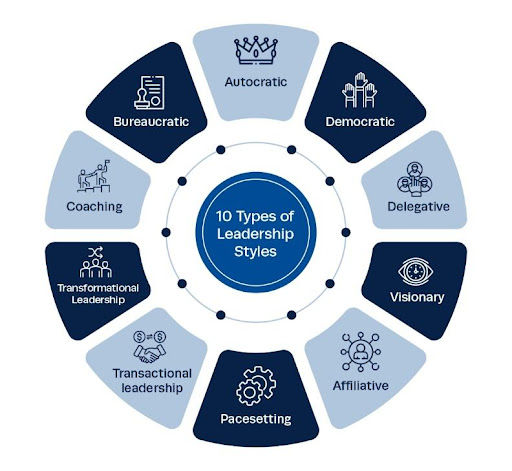The Ultimate Guide to Effective Management Styles for 2023
Updated: Apr 6, 2023

Source: cleverism
Introduction
In today's rapidly evolving business environment, effective management styles are more critical than ever. The way managers lead their teams can significantly impact employee performance, job satisfaction, and overall company culture. This comprehensive guide will explore various management styles that are relevant for 2023, helping you identify the best approach for your team and organization.
1. Autocratic Management Style
The autocratic management style is characterized by a top-down approach, where the manager makes decisions with little to no input from their team members. This style can be effective in situations that require quick decision-making and strict control.
Pros:
Efficient decision-making
Clear expectations and direction
Can be effective in high-pressure situations
Cons:
May stifle creativity and innovation
Can lead to low employee morale and job satisfaction
Not suitable for teams that require collaboration and flexibility
2. Democratic Management Style
The democratic management style involves seeking input from team members and encouraging open communication. This collaborative approach empowers employees to contribute to decision-making processes and fosters a sense of ownership.
Pros:
Promotes employee engagement and satisfaction
Encourages innovation and creativity
Builds trust and respect within the team
Cons:
Decision-making can be slower due to increased input
Potential for conflicts and disagreements
May not be effective in times of crisis
3. Laissez-faire Management Style
Laissez-faire management is a hands-off approach, allowing team members to make decisions and manage their work independently. This style works best with experienced and self-motivated employees who thrive on autonomy.
Pros:
Encourages individual growth and development
Fosters creativity and innovation
Allows managers to focus on strategic planning
Cons:
Risk of miscommunication and lack of direction
May lead to inconsistencies in performance
Not suitable for teams that require close supervision and guidance
4. Transformational Management Style
Transformational management focuses on inspiring and motivating employees to reach their full potential. Managers with this style often serve as role models, fostering a culture of continuous improvement and personal growth.
Pros:
Boosts employee morale and job satisfaction
Encourages innovation and creative problem-solving
Can lead to increased productivity and performance
Cons:
Requires significant time and effort from managers
May not be suitable for routine or task-oriented work
Relies heavily on the manager's charisma and interpersonal skills

Source: Project Management Institute.
5. Servant Leadership Management Style
Servant leadership emphasizes putting the needs of the team first, fostering a supportive and collaborative work environment. Managers with this style prioritize employee development and well-being, often leading by example.
Pros:
Promotes a positive and inclusive company culture
Builds trust and respect within the team
Encourages employee growth and development
Cons:
May be perceived as weak or passive by some employees
Balancing employee needs with organizational goals can be challenging
Requires a high level of emotional intelligence and empathy
6. Situational Management Style
The situational management style involves adapting leadership techniques to fit the specific needs of the team and situation. This flexible approach recognizes that different circumstances may require different management strategies.
Pros:
Adapts to the unique needs and strengths of the team
Allows for a tailored approach to problem-solving
Can be effective in a variety of situations and environments
Cons:
Requires a high level of adaptability and versatility
Can be challenging to maintain consistency in leadership
May be difficult for managers who prefer a more structured approach
7. Cross-Cultural Management Style
Cross-cultural management focuses on understanding and embracing diverse cultural backgrounds within the team. This inclusive style is crucial for global organizations and teams with members from various cultural backgrounds.
Pros:
Fosters a diverse and inclusive work environment
Encourages collaboration and innovation
Enhances communication and understanding among team members
Cons:
Requires cultural sensitivity and awareness
May necessitate additional training and resources
Can be challenging to navigate cultural differences and expectations
8. Remote Management Style
Remote management has become increasingly important with the rise of remote work and distributed teams. This style focuses on clear communication, trust-building, and leveraging technology to maintain team cohesion and productivity.
Pros:
Supports flexible work arrangements and work-life balance
Leverages technology for improved collaboration and communication
Can lead to increased employee satisfaction and retention
Cons:
Requires strong communication skills and adaptability
Risk of miscommunication and feelings of isolation
May necessitate additional tools and resources for effective remote work
8. Adapting Your Management Style for the Future
The most effective managers are those who can adapt their leadership style to the changing needs of their team and organization. Emotional intelligence, flexibility, and adaptability are essential traits for managers in 2023 and beyond. To refine and improve your management style:
Assess your current approach and its effectiveness with your team
Stay informed about industry trends and best practices in management
Seek feedback from your team and be open to making adjustments
XI. Conclusion
Understanding and implementing the right management style for your team can significantly impact its success and overall organizational performance. By exploring and adopting effective management styles for 2023, you can foster a positive work environment that encourages collaboration, innovation, and growth. As a manager, continually assess and refine your approach to stay relevant and effective in an ever-changing business landscape.

Comments